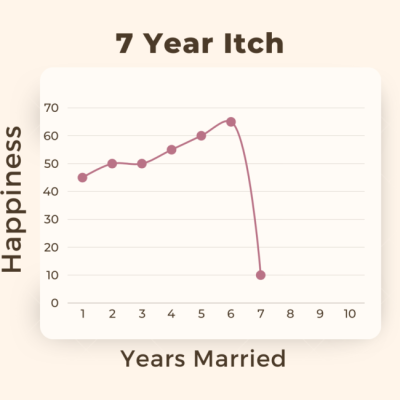The 7 Year Itch: True or False?
By Jimmy Sliwa

It was 7 years into our marriage when all hell broke loose!
I had been lying to my wife about my pornography addiction and she had had enough. It took lots of counseling, prayer, and work to get to the great marriage we experience today.
I feel blessed to have just celebrated my 10 years anniversary, but looking back it does make me wonder… was this difficult marriage experience a classic example of the so called “seven-year-itch?”
Or was it something else?
The “seven-year itch” is a popular concept that suggests couples may experience a decline in marital satisfaction or an increase in the likelihood of divorce around the seventh year of marriage.

This phenomenon has been the subject of much speculation and curiosity, with many wondering – is there is any truth to this idea?
In this blog post, we will explore the concept of the seven-year itch, examine the research behind it, and discuss whether it is a true concept or simply a myth.
What is the Seven-Year Itch?
The term “seven-year itch” was popularized by the 1955 film of the same name, starring Marilyn Monroe and Tom Ewell. The film portrays a man who becomes tempted to stray from his marriage after seven years of wedded bliss.
This concept has since become a cultural trope, often used to describe a period of marital dissatisfaction or restlessness that may occur around the seven-year mark.
The idea is that after 7 years of marriage, couples experience difficult times and may reach “a point of reckoning” in their marriage. Do we stay together or get divorced?
Like I said earlier, my own marriage reached this point at about the 7 years of marriage mark. My wife and I had reached a breaking point and ultimately decided to separate for a time so that we could work on our relationship.
Based upon the “7-year itch” concept, one might deduct that I had fallen victim to this phenomenon. But you and me both know that marriage and relationships are much more nuanced that a timeline.
It almost seems too predictable for there to be a magic number of years married that influences our discontentment. I’m not one to believe in superstitions, so let’s take a dive into the research.
Research on the Seven-Year Itch:
Despite its widespread recognition, the concept of the seven-year itch has actually been largely debunked by research. (Hah….I knew it!). Several studies have examined the relationship between marital duration and divorce rates, and the results do NOT support the idea of a significant increase in divorce risk at the seven-year mark.
In addition, several studies looking at marital satisfaction also do NOT support the idea of a decrease at the seven-year mark.
Study #1:
One study, published in the Journal of Family Psychology, analyzed data from over 2,000 couples and found that the risk of divorce does not increase significantly around the seventh year of marriage. Instead, the researchers found that the risk of divorce is highest in the early years of marriage, particularly within the first two years.
Study # 2:
Another study, published in the Journal of Marriage and Family, found that marital satisfaction tends to decline gradually over time, rather than spiking at the seven-year mark. This decline was attributed to various factors, such as changes in life circumstances (i.e. baby or debt), communication shortcomings, and changing relationship dynamics.
Study #3:
Lastly, a final study also published in the Journal of Marriage and Family, found that for most couples, satisfaction does not decline over time but actually stays relatively stable for long durations of time. They found that if you start off marriage happy and on the same page, this is a good indication that your marital satisfaction will remain similar.
Conclusion: Clearly, there is no consensus on time married and marital happiness. Relationships are much more complicated. Instead, it seems that there are other factors at play that have a bigger indication of marital satisfaction.

Factors Influencing Marital Satisfaction:
While the seven-year itch may not be a real phenomenon, it is important to acknowledge that marital satisfaction can fluctuate over time. This is actually normal.
Several factors influence the quality of a marriage, including communication habits, conflict resolution skills, shared values and goals, and individual personalities.
Additionally, life events such as the birth of a child, career changes, financial stress, and health issues can impact marital satisfaction.
Couples who are able to navigate these challenges together and maintain open and honest communication are more likely to have a strong and lasting marriage.
Tips for Strengthening Your Marriage:
Even if the seven-year itch may be more myth than reality, it highlights the importance for couples to actively work on their relationship. Regular work and attention is the only way to keep it strong and healthy.
At the Husband’s Club we know the importance of pursuing your wife in all stages of marriages. Remember, she is still worth fighting for! Here are some tips for strengthening your marriage:
- Communicate with extreme vulnerability (5 Hacks to Improve Communication)
- Schedule in time for each other – Put it on the calendar or it won’t happen.
- Show regular appreciation for your partner.
- Solve problems together.
- Keep the romance alive by planning regular date nights and romantic gestures. (The Ultimate Date Idea List)
- Seek support from a therapist or counselor if needed. (BetterHelp – Get Started & Sign-Up Today)
Conclusion:
The seven-year itch may be a catchy phrase, but it is NOT a true representation of the complexities of marriage.
While marital satisfaction may fluctuate over time, there is no evidence to suggest that couples are more likely to divorce around the seventh year of marriage. But what we know for sure is that marriages take work.
By focusing on vulnerable communication, mutual respect, and shared goals, couples can strengthen their relationship and maintain a lasting marriage.


